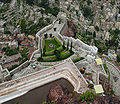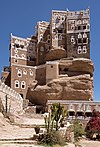Portal:Yemen
Yemen Portal


Yemen, officially the Republic of Yemen, is a country in West Asia. Located in southern Arabia, it borders Saudi Arabia to the north, Oman to the northeast, the Red Sea to the west, and the Indian Ocean to the south, sharing maritime borders with Eritrea, Djibouti and Somalia across the Horn of Africa. Covering roughly 528,000 square kilometres (203,861 square miles), with a coastline of approximately 2,000 kilometres (1,200 miles), Yemen is the second largest country on the Arabian Peninsula. Sanaa is its constitutional capital and largest city. Yemen's estimated population is 34.7 million, mostly Arab Muslims. It is a member of the Arab League, the United Nations, the Non-Aligned Movement and the Organisation of Islamic Cooperation.
Owing to its geographic location, Yemen has been at the crossroads of many civilisations for over 7,000 years. In 1200 BCE, the Sabaeans formed a thriving commercial kingdom that included parts of modern Ethiopia and Eritrea. In 275 CE, it was succeeded by the Himyarite Kingdom, which spanned much of Yemen's present-day territory and was heavily influenced by Judaism. Christianity arrived in the fourth century, followed by the rapid spread of Islam in the seventh century. Yemenite troops played a crucial role in early Islamic conquests. Various dynasties emerged between the 9th and 16th centuries. During the 19th century, the country was divided between the Ottoman and British empires. After World War I, the Kingdom of Yemen was established, which in 1962 became the Yemen Arab Republic (North Yemen) following a coup. In 1967, the British Aden Protectorate became the independent People's Democratic Republic of Yemen (South Yemen), the first and only officially socialist state in the Arab world. In 1990, the two Yemeni states united to form the modern Republic of Yemen, with Ali Abdullah Saleh serving as the first president until his resignation in 2012 in the wake of the Arab Spring.
Since 2011, Yemen has been enduring a political crisis, marked by street protests against poverty, unemployment, corruption, and President Saleh's plan to amend Yemen's constitution and eliminate the presidential term limit. By 2015, the country became engulfed by an ongoing civil war with multiple entities vying for governance, including the Presidential Leadership Council of the internationally recognized government, and the Houthi movement's Supreme Political Council. This conflict, which has escalated to involve various foreign powers, has led to a severe humanitarian crisis. (Full article...)
Selected article -
The Queen of Sheba, known as Bilqis in Yemeni and Islamic tradition and as Makeda in Ethiopian tradition, is a figure first mentioned in the Hebrew Bible. In the original story, she brings a caravan of valuable gifts for the Israelite King Solomon. This account has undergone extensive Jewish, Islamic, Yemenite and Ethiopian elaborations, and it has become the subject of one of the most widespread and fertile cycles of legends in Asia and Africa.
Modern historians and archaeologists identify Sheba as the ancient South Arabian kingdom of Saba that existed in modern-day Yemen, although no trace of the queen herself has been found. The Queen's existence is disputed among some historians. (Full article...)
List of selected articles
|
|---|
Selected biography -
Hassan al-Amri (Arabic: حسن العمري) (1920 – 7 April 1989) was a Yemeni lieutenant general and Prime Minister of the Yemen Arab Republic for five terms between 1964 and 1971. He was popularly known as The General of Yemen. (Full article...)
List of selected biographies
|
|---|
General images -
Selected city -
Al Hudaydah (Arabic: الْحُدَيْدَة, romanized: al-ḥudayda), also transliterated as Hodeda, Hodeida, Hudaida or Hodeidah, is the fourth-largest city in Yemen and its principal port on the Red Sea and it is the centre of Al Hudaydah Governorate. As of 2023, it has an estimated population of 735,000. (Full article...)
Selected picture -
Selected cuisines, dishes and foods -
Fatteh (Arabic: فتّة meaning crushed or crumbs, also romanized as fette, fetté, fatta or fattah) is an Egyptian and Levantine dish consisting of pieces of fresh, toasted, grilled, or fried flatbread covered with other ingredients that vary according to region. It is also some times referred to as shâmiyât (Arabic: شاميات "Damascene") in the Levant area. (Full article...)
List of articles
|
|---|
Related portals
Religions in Yemen
Arab states
Related portals
Categories
Topics
Related portals
Religions in Yemen
Arab states
Related portals
Associated Wikimedia
The following Wikimedia Foundation sister projects provide more on this subject:
-
Commons
Free media repository -
Wikibooks
Free textbooks and manuals -
Wikidata
Free knowledge base -
Wikinews
Free-content news -
Wikiquote
Collection of quotations -
Wikisource
Free-content library -
Wikiversity
Free learning tools -
Wiktionary
Dictionary and thesaurus











































































